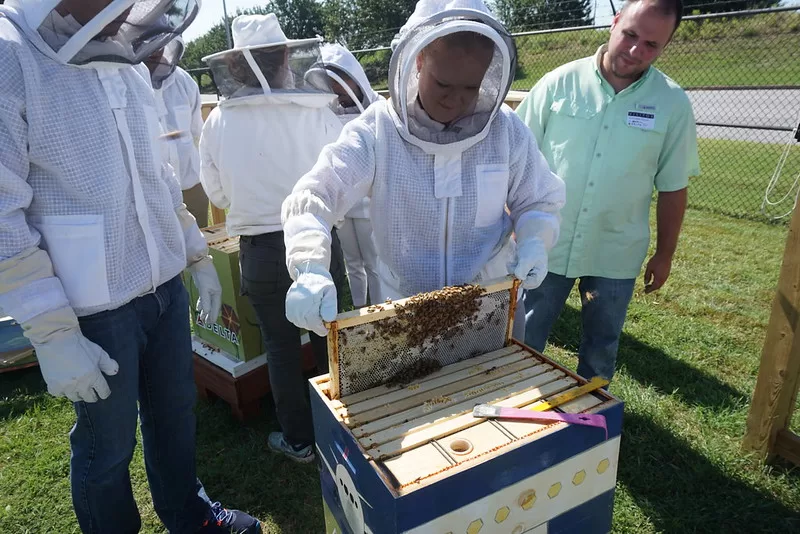It’s hard to learn how to be a good beekeeper without running into some problems along the way. There is no such thing as a perfect beekeeper at all times. On the other hand, you can pick up useful information from other people.
By familiarising yourself with the errors that inexperienced beekeepers most frequently make, you will likely avoid making some of those errors with your own hives. Hence, keep an eye out for beekeeping mistakes you should avoid.

What Is Beekeeping?
Apiculture, which is sometimes called “beekeeping,” is the study of honey bees and keeping them for business or personal use. The earliest beekeepers were hunters who would seek out and destroy honey bee nests in the wild to harvest the sweet nectar that gives these insects their name. If you look more closely at beekeeping, you might learn about why do bees make honey.
Some Beekeeping Mistakes and Solutions
Beekeeping is a challenging hobby with a steep learning curve, especially for beginners. Relaxing and thinking through your next moves is the best way to ensure you don’t make any blunders. Always carefully consider your next move, but make sure to put things on track.
Most mistakes in beekeeping are small, but they can add up to big problems in the long run. If you take the time to get the details right at the beginning of the beekeeping process, the job will be much simpler for you in the long run. The following is a list of issues that are easy to avoid:
Read Also:
● Start With One Colony
Begin with a single colony. This is one of the most challenging tasks. Also, this is not an insurmountable hurdle, but neither is pleasant. Borrowing supplies from another colony is a common solution to issues.
To get through a crisis, a colony may borrow resources from another colony, like open broods, workers, or eggs in the event of the loss of a queen. Unfortunately, without a backup colony, your choices are restricted.
● Not Giving New Colonies Food
Getting a new colony off the ground is difficult when there is little food on hand. Foraging for nectar and pollen, constructing a comb, rearing young, protecting the hive, and keeping the nest warm all require a lot of energy.
Brood rearing will slow to a crawl, and the colony will languish if too many workers have to spend their time hunting for a minimal food source. And if it’s too wet, windy, or cold, they cannot start raising their young at all. So adding sugar to water is all needed to sustain the colony while it grows.
● Adding Too Many Steps
The majority of beekeeping can be described as “easy-peasy.” You shouldn’t make things like creating sugar syrup, burning a hive, and treating varroa into challenges just because they’re there.
Be wary of any piece of guidance that comes with a lengthy list of restrictions and caveats. If everything doesn’t go as planned the first time, you should still be able to get things to work. Bees are tough organisms that can tolerate a certain amount of carelessness. Take what you’ve learned from failures and go forward.
● Worried About Too Much Sun
Commercial beekeepers popularised the notion that honey bee colonies needed to be placed in direct sunlight. To maximize profits, beekeepers must keep their hives active for as many hours per day as possible, regardless of whether they’re rearing bees for pollination or honey. So when beehives are put where they get direct sunlight, the bees will work for extended periods.
Bees, on the other hand, might have a different opinion. When given the option, bees choose a shady spot near a sunny region for a home rather than one directly in the sun. Of course, the best time for both is early morning when the sun is still quite warm. In any case, you shouldn’t spend too much time fretting over it because some alternative arrangement will work just as well.
● Ignoring That There Is No Queen
Be aware of the symptoms of a lack of a queen. And then, if your bees are acting like they don’t have a queen, you should investigate. A timely inspection can prevent irreparable damage to your colony, so have faith in yourself and do it.
If your prediction was off and she ended up being alright, you wouldn’t have lost anything. But unfortunately, one of the most common and expensive beekeeping blunders is neglecting the health of the queen bee.
● Making Simple Jobs Complicated
Keeping bees can be a breeze in certain respects. Don’t let routine procedures like sugar syrup preparation or smoking a hive for varroa treatment stress you out.
Avoid any advice that comes with a long list of caveats and warnings. If things don’t go perfectly the first time, don’t worry; you’ll still likely be able to get things done. In general, bees are resilient organisms that can weather the occasional mishandling. Do not worry too much about failing at beekeeping because you can learn from your mistakes and move on. Indeed, you can succeed at this.
● Harvesting Too Much Honey
Remember that your “portion” can be nothing, and don’t take any more than your fair share. It happens a lot.
If you’re the type who can’t help but your honey crop isn’t ready for harvesting, try scraping off a tiny bit with the spoon’s tip. There is nothing like warm honey straight from the hive.
Conclusion
With all the information above, you can avoid making these common mistakes. You may make more. It’s okay, as everything is a learning process, and these tips will surely help you begin with beekeeping.









